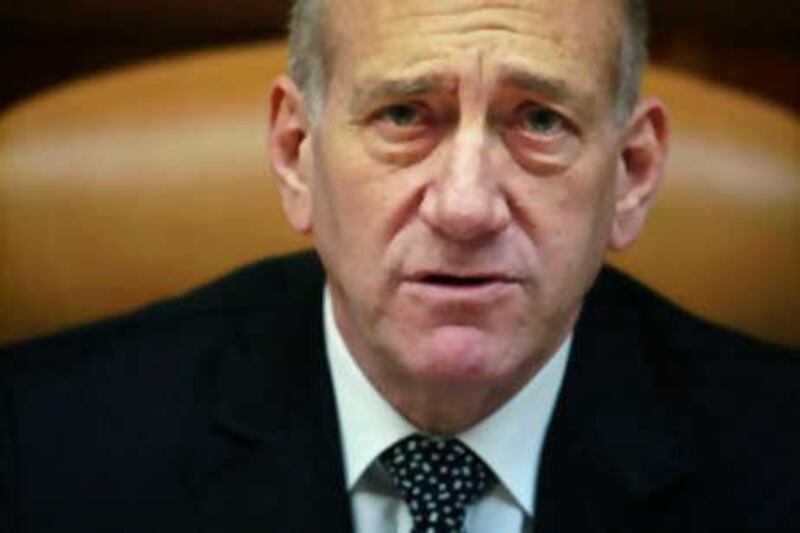Israeli leaders have a habit late in life of proposing solutions to problems they have done a great deal to cause. Yitzhak Rabin, as defence minister, ordered Israeli soldiers to break the bones of peaceful Palestinian protesters during the first intifada, then won a Nobel Peace Prize after becoming an ardent supporter for peace with his crooked-limbed foes. Ariel Sharon ascended to power on his strength as the architect of the settlement enterprise, then, in a late-life conversion, came to believe that Israel's military occupation of the Palestinian territories was corrupting the army he loved and endangering the Jewish state he had fought to create.
Now there is another newcomer to this fraternity of August converts urging a just peace with the Palestinians: Ehud Olmert, Israel's disgraced caretaker prime minister. Mr Olmert rose in the Israeli political establishment on Mr Sharon's coattails, parroting his mentor's harsh right-wing diatribes, opposing the 1978 Camp David Peace Accords and arguing against the withdrawal of any land seized in the 1967 Middle East war.
Yet like those who came before him, the lofty perch of Israel's highest political office has apparently opened Mr Olmert's eyes. Mirroring in broad terms what many Palestinians have been demanding for years - as well as the vision set forth in the 2002 Arab Peace Initiative - he declared yesterday that Israel should withdraw from nearly all territory captured in 1967 in return for peace with the Palestinians and Syria.
In comments marking the Jewish New Year, Mr Olmert said the vacated land should include the Golan Heights and East Jerusalem. The latter was an especially significant concession, given that for decades he had argued and campaigned on the platform of Jerusalem as Israel's "eternal, undivided" capital. "In the end of the day, we will have to withdraw from the most decisive areas of the [Palestinian] territories," the prime minister explained to an Israeli daily newspaper, Yedioth Ahronoth. "In exchange for the same territories left in our hands, we will have to give compensation in the form of territories within the state of Israel."
In often scathing terms, Mr Olmert also chastised domestic opponents of a deal with Damascus. "First and foremost, we must make a decision. I'd like see if there is one serious person in the state of Israel who believes it is possible to make peace with the Syrians without eventually giving up the Golan Heights." "It is true that an agreement with Syria comes with danger," Mr Olmert said. "Those who want to act with zero danger should move to Switzerland."
Since corruption allegations began airing against him last year, Mr Olmert, who turns 63 today, has suffered a rapid fall from political grace. This month, Israeli police recommended criminal charges against him. Within days, he announced he would leave office after Israel's parliament approved a new government. In the meantime, he has pledged to continue closed-door negotiations with the Palestinians until he leaves office.
According to unnamed western and Palestinian officials quoted in the Israeli media, Mr Olmert has proposed an Israeli withdrawal from 93 per cent of the West Bank, plus all of the Gaza Strip. In exchange for the settlement enclaves, he has proposed about a five-per-cent land swap giving the Palestinians a desert territory adjacent to the Gaza Strip, as well as land on which to build a transit corridor between Gaza and the West Bank.
Yet Mr Olmert is, politically speaking, a lame duck, with almost no power to see any of his views reach fruition. Thus, in the tortured history of the peace process, where all actions and motives are suspect, reactions to his latest comments have been caustic, to say the least. "Why didn't he put forth a concrete plan like this when he had power?" asked Fares Braizat, director of the Centre for Strategic Studies at the University of Jordan. "It reinforces what many already believe: Israeli leaders are not interested in peace, only the 'peace process'."
Jeff Halper, head of the Israeli Committee Against House Demolitions and a professor of anthropology, said Mr Olmert's views were a "conjuring trick". "Olmert's talking about dismantling most of the tiny settlements but keeping the overwhelming majority of the settlers in place," he said. "His proposals are ? designed to perpetuate Israeli control." Ordinary Israelis were no less vitriolic, suggesting that Mr Olmert's comments run the risk of tainting any progress he might may in talks with the Palestinians, given the disdain with which he is currently regarded by most Israelis.
"Olmert wishing us, 'Shana tova' [Happy New Year]," said Cipora Julianna Kohn, writing about the prime minister's latest remarks on one Israeli website. "It is a drip, drip of poison from this vain and foolish man." In his interview with Yedioth Ahronoth, Mr Olmert insisted that his comments about the necessity for concessions were not part of a campaign for self-exoneration or a bid for sympathy to Israelis, a majority of whom, according to public opinion polls, support a two-state solution and regard Jewish settlers in the West Bank with chagrin or disdain.
"I am not trying to justify retroactively what I did for 35 years. For a large portion of these years, I was unwilling to look at reality in all its depth," he said. For Mr Braizat, such second thoughts - if that is what they were - are, if nothing else, dispiriting and not a little tragic. "Political leaders must be strong and appear strong," he said. "Sadly, it's only when they're on the verge of leaving office and worried about their legacy that they suddenly become wise men."
cnelson@thenational.ae * Jonathan Cook contributed to this report from Jerusalem





